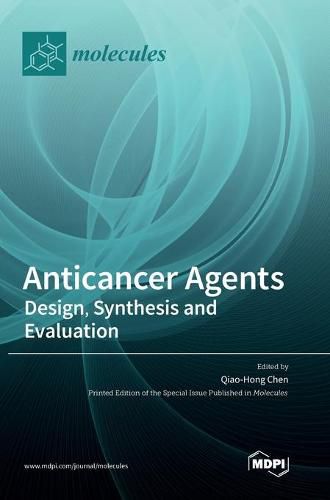Readings Newsletter
Become a Readings Member to make your shopping experience even easier.
Sign in or sign up for free!
You’re not far away from qualifying for FREE standard shipping within Australia
You’ve qualified for FREE standard shipping within Australia
The cart is loading…






This title is printed to order. This book may have been self-published. If so, we cannot guarantee the quality of the content. In the main most books will have gone through the editing process however some may not. We therefore suggest that you be aware of this before ordering this book. If in doubt check either the author or publisher’s details as we are unable to accept any returns unless they are faulty. Please contact us if you have any questions.
This book is a printed edition of the Special Issue entitled Anticancer Agents: Design, Synthesis and Evaluation that was published in Molecules. Two review articles and thirty research papers are included in the Special Issue. Three second-generation androgen receptor antagonists that have been approved by the U.S. FDA for the treatment of prostate cancer have been reviewed. Identification of mimics of protein partners as protein-protein interaction inhibitors via virtual screening has been summarized and discussed. Anticancer agents targeting various protein targets, including IGF-1R, Src, protein kinase, aromatase, HDAC, PARP, Toll-Like receptor, c-Met, PI3Kdelta, topoisomerase II, p53, and indoleamine 2,3-dioxygenase, have been explored. The analogs of three well-known tubulin-interacting natural products, paclitaxel, zampanolide, and colchicine, have been designed, synthesized, and evaluated. Several anticancer agents representing diverse chemical scaffolds were assessed in different kinds of cancer cell models. The capability of some anticancer agents to overcome the resistance to currently available drugs was also studied. In addition to looking into the in vitro ability of the anticancer agents to inhibit cancer cell proliferation, apoptosis, and cell cycle, in vivo antitumor efficacy in animal models and DFT were also investigated in some papers.
$9.00 standard shipping within Australia
FREE standard shipping within Australia for orders over $100.00
Express & International shipping calculated at checkout
Stock availability can be subject to change without notice. We recommend calling the shop or contacting our online team to check availability of low stock items. Please see our Shopping Online page for more details.
This title is printed to order. This book may have been self-published. If so, we cannot guarantee the quality of the content. In the main most books will have gone through the editing process however some may not. We therefore suggest that you be aware of this before ordering this book. If in doubt check either the author or publisher’s details as we are unable to accept any returns unless they are faulty. Please contact us if you have any questions.
This book is a printed edition of the Special Issue entitled Anticancer Agents: Design, Synthesis and Evaluation that was published in Molecules. Two review articles and thirty research papers are included in the Special Issue. Three second-generation androgen receptor antagonists that have been approved by the U.S. FDA for the treatment of prostate cancer have been reviewed. Identification of mimics of protein partners as protein-protein interaction inhibitors via virtual screening has been summarized and discussed. Anticancer agents targeting various protein targets, including IGF-1R, Src, protein kinase, aromatase, HDAC, PARP, Toll-Like receptor, c-Met, PI3Kdelta, topoisomerase II, p53, and indoleamine 2,3-dioxygenase, have been explored. The analogs of three well-known tubulin-interacting natural products, paclitaxel, zampanolide, and colchicine, have been designed, synthesized, and evaluated. Several anticancer agents representing diverse chemical scaffolds were assessed in different kinds of cancer cell models. The capability of some anticancer agents to overcome the resistance to currently available drugs was also studied. In addition to looking into the in vitro ability of the anticancer agents to inhibit cancer cell proliferation, apoptosis, and cell cycle, in vivo antitumor efficacy in animal models and DFT were also investigated in some papers.